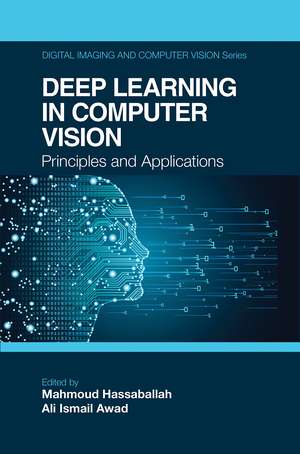Deep Learning in Computer Vision: Principles and Applications: Digital Imaging and Computer Vision
Editat de Mahmoud Hassaballah, Ali Ismail Awaden Limba Engleză Paperback – 13 dec 2021
| Toate formatele și edițiile | Preț | Express |
|---|---|---|
| Paperback (1) | 390.63 lei 6-8 săpt. | |
| CRC Press – 13 dec 2021 | 390.63 lei 6-8 săpt. | |
| Hardback (1) | 648.94 lei 6-8 săpt. | |
| CRC Press – 7 apr 2020 | 648.94 lei 6-8 săpt. |
Preț: 390.63 lei
Nou
Puncte Express: 586
Preț estimativ în valută:
74.77€ • 81.24$ • 62.85£
74.77€ • 81.24$ • 62.85£
Carte tipărită la comandă
Livrare economică 21 aprilie-05 mai
Preluare comenzi: 021 569.72.76
Specificații
ISBN-13: 9781032242859
ISBN-10: 103224285X
Pagini: 338
Ilustrații: 124 Illustrations, color; 6 Illustrations, black and white
Dimensiuni: 156 x 234 x 18 mm
Greutate: 0.48 kg
Ediția:1
Editura: CRC Press
Colecția CRC Press
Seria Digital Imaging and Computer Vision
ISBN-10: 103224285X
Pagini: 338
Ilustrații: 124 Illustrations, color; 6 Illustrations, black and white
Dimensiuni: 156 x 234 x 18 mm
Greutate: 0.48 kg
Ediția:1
Editura: CRC Press
Colecția CRC Press
Seria Digital Imaging and Computer Vision
Cuprins
Chapter 1 Accelerating the CNN Inference on FPGAs Chapter 2 Object Detection with Convolutional Neural Networks Chapter 3 Efficient Convolutional Neural Networks for Fire Detection in Surveillance Applications Chapter 4 A Multi-biometric Face Recognition System Based on Multimodal Deep Learning Representations Chapter 5 Deep LSTM-Based Sequence Learning Approaches for Action and Activity Recognition Chapter 6 Deep Semantic Segmentation in Autonomous Driving Chapter 7 Aerial Imagery Registration Using Deep Learning for UAV Geolocalization Chapter 8 Applications of Deep Learning in Robot Vision Chapter 9 Deep Convolutional Neural Networks: Foundations and Applications in Medical Imaging Chapter 10 Lossless Full-Resolution Deep Learning Convolutional Networks for Skin Lesion Boundary Segmentation Chapter 11 Skin Melanoma Classification Using Deep Convolutional Neural Networks
Notă biografică
Mahmoud Hassaballah received the Doctor of Engineering (D. Eng.) in Computer Science from Ehime University, Japan in 2011. He was a visiting scholar with the Department of Computer & Communication Science, Wakayama University, Japan and GREAH laboratory, Le Havre Normandie University, France. He is currently an Associate Professor of Computer Science at the Faculty of Computers and Information, South Valley University, Egypt. His research interests include feature extraction, object detection/recognition, artificial intelligence, biometrics, image processing, computer vision, machine learning, and data hiding.
Ali Ismail Awad is currently an Associate Professor (Docent) with the Department of Computer Science, Electrical and Space Engineering, Luleå University of Technology, Luleå, Sweden, where he also serves as a Coordinator of the Master Programme in Information Security. He is a Visiting Researcher with the University of Plymouth, United Kingdom. He is also an Associate Professor with the Electrical Engineering Department, Faculty of Engineering, Al-Azhar University at Qena, Qena, Egypt. His research interests include information security, Internet-of-Things security, image analysis with applications in biometrics and medical imaging, and network security.
Ali Ismail Awad is currently an Associate Professor (Docent) with the Department of Computer Science, Electrical and Space Engineering, Luleå University of Technology, Luleå, Sweden, where he also serves as a Coordinator of the Master Programme in Information Security. He is a Visiting Researcher with the University of Plymouth, United Kingdom. He is also an Associate Professor with the Electrical Engineering Department, Faculty of Engineering, Al-Azhar University at Qena, Qena, Egypt. His research interests include information security, Internet-of-Things security, image analysis with applications in biometrics and medical imaging, and network security.
Descriere
This book presents a collection of eleven chapters where each individual chapter explains the deep learning principles of a specific topic, introduces reviews of up-to-date techniques, and presents research findings to the computer vision community.










